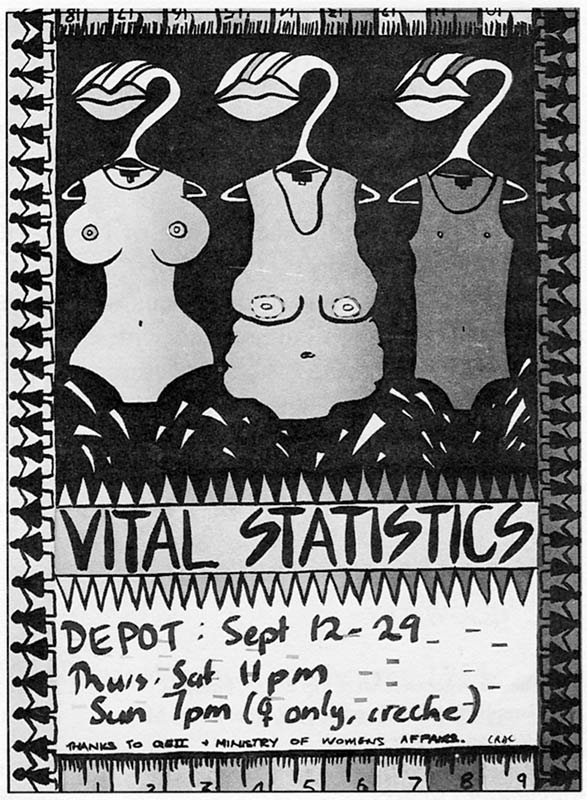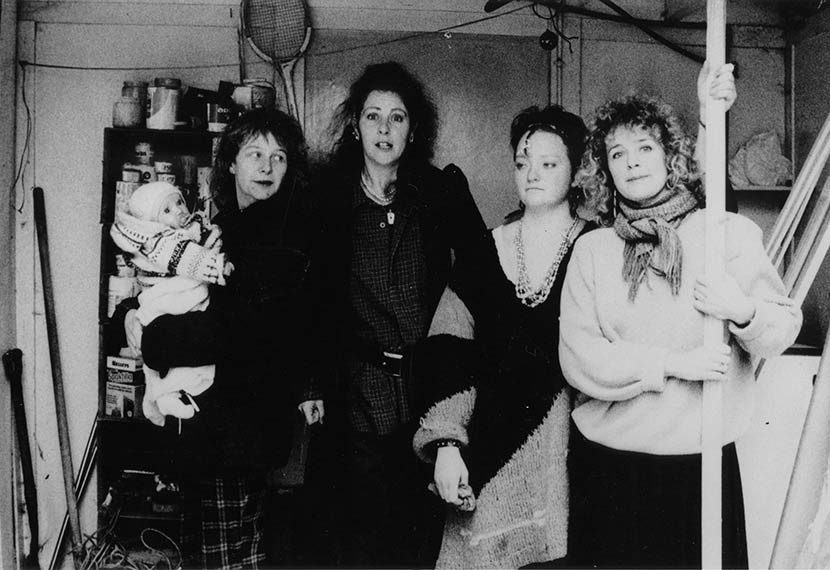This essay written by Fiona Samuel was first published in Women Together: a History of Women's Organisations in New Zealand in 1993.
The Wellington Equity Women's Caucus was made up of women working in theatre, television and film in the mid-1980s. Primarily actors, the group also included writers, script editors and directors. Membership was never formalised, but held at around 40 for the three years of the caucus's active life. The age of members ranged from the early twenties to the late sixties; the group was racially mixed and included single, married and lesbian women.
The caucus was founded in June 1984, following a one-day seminar funded by the newly established Ministry of Women's Affairs. The seminar was organised by six members of the actors' trade union, Equity, and all female members of the union were invited to attend. [1] It focused on women actors' growing dissatisfaction with the few and limited roles available to them in local film and television productions. Research based on recent Television New Zealand dramas showed that 70 percent of roles went to men, 30 percent to women. Most stories were centred around male characters, and told from a male point of view.
Approximately 40 women attended, and common concerns were quickly identified. In September 1984, the caucus adopted a twelve-point statement of policy. Its primary objectives were equal opportunity for female performers, promotion of non-stereotyped images of women in drama, and support for the exchange and development of skills among women in the industry.

Alexander Turnbull Library, Ephemera Collection
Poster advertising ‘Vital Statistics’, a performance group associated with Wellington Equity Women’s Caucus, 1985.
The caucus was publicly introduced to the film and television industries at the Guild Of Film and Television Arts (GOFTA) conference in November 1984. Dulcie Smart spoke on the inequality of opportunity for female performers and women's desire for strong role models in drama, and Fiona Samuel outlined positive changes to work for over the next ten years, including more projects with central female characters, less stereotyping of female characters and roles, and ongoing government funding support for local drama. The caucus presence at the conference made a strong impact, and a three-page guide to the aims of the caucus and the representation of female characters in drama was distributed to all participants.
At that time, an Auckland branch of the caucus was established, with a similar agenda. Wellington Equity Women's Caucus established links with Mediawomen, a group of female writers, researchers, technicians, producers and directors, in film, television and the print media, who shared similar concerns.

Alexander Turnbull Library, Aileen Davidson Collection, 1/2-173815-F. (sourced from Te Ara)
The performance group Vital Statistics toured the North Island in the mid-1980s. Director Aileen Davidson (left), and performers (left to right) Perry Piercy, Stella Duffy and Nicola Manthel, were also members of Wellington Equity Women's Caucus.
The caucus maintained a public profile and established further connections with women's groups by providing entertainment at functions for organisations such as the Family Planning Association and the Parkview Clinic. Vital Statistics, a performance group featuring caucus members Perry Piercy, Stella Duffy, Nicola Manthel and director Aileen Davidson, toured the North Island with two self-devised shows. Their work used comedy, music and statistics to explore the making and breaking of female stereotypes. Vital Statistics performed in secondary schools, cafes and church halls, and to a wide variety of women's groups.
In November 1985, Fiona Samuel and Dulcie Smart presented a submission from the caucus to the Royal Commission on Broadcasting and Related Telecommunications. The submission focused on equal representation for women in all areas of broadcasting, and strongly supported a quota system for local drama. It concluded, 'The women of New Zealand are waiting to see their lives portrayed with insight.'
By 1987, the Wellington caucus was no longer meeting, due to members' involvement with their careers and with child-rearing. However, it was never formally dissolved, and the connections it forged between women in the industry proved lasting. The development of strong female-oriented dramas in the 1980s and the continued work of caucus members in theatre, television and film indicated that much was achieved in the years of activity, and that the influence of the caucus continued to be felt by the makers and viewers of New Zealand drama.
Fiona Samuel
Notes
[1] The six organisers were Pip Byrne, Philippa Campbell, Aileen Davidson, Rachel Lang, May Lloyd and Dulcie Smart.
Unpublished sources
Samuel, Fiona, 'R.I.P. Alienated Macho Dickhead— You've Earned The Rest', speech delivered at the Guild Of Film and Television Arts (GOFTA) conference, November 1984
Smart, Dulcie, 'Whose Identity? or Why I Loved Emma Peel', speech delivered at the Guild Of Film and Television Arts (GOFTA) conference, November 1984
Wellington Equity Women's Caucus, Statement of Policy, adopted 22 September 1984, in possession of Fiona Samuel, Auckland
Wellington Equity Women's Caucus, 'The Girl Who's Sick of Being a Bitch' (outline of caucus aims and guide to analysing the presentation of female characters in drama), November 1984, in possession of Fiona Samuel, Auckland
Wellington Equity Women's Caucus, Submission to the Royal Commission on Broadcasting and Related Telecommunications, November 1985, in possession of Fiona Samuel, Auckland
Published sources
Lang, Rachel, and Sue May, 'Conference Report: Going For Broke ... Or Breaks', OnFilm, Vol. 2 No. 2, 1985, pp. 25–29

Community contributions